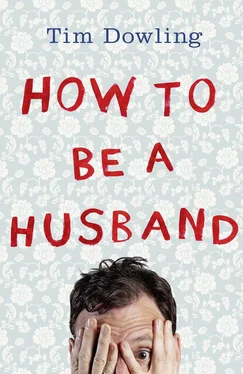Finally, at sunset, my wife returns.
‘He was very nice about it,’ she says. ‘He gave me some money from the distressed seaman’s fund.’
We pay our bill and return to the mainland in search of a room close to the bus station, so we can get to the airport first thing and put this whole honeymoon business behind us. The hotel we select is so cheap that it doesn’t even start until the second floor of the run-down building it occupies, and you need to put money in the lift to make it go up. It’s just the sort of place two distressed seamen might spend their last night in Naples.
The front desk is a man in a hat sitting at a folding table on the landing. He also sells beer, fags and soap. But the room has huge windows and a fresco covering the whole ceiling, apart from a bit in the corner where they cut into the plaster to install a shower cubicle. We sit in the window and take a picture of ourselves with a timer, looking out onto the street at dusk. When I want to remember that I had a romantic honeymoon in Naples with the woman I love, that’s the one I look at.
In a lot of ways it does not feel as if we’re genuinely married until we turn up at passport control with our paperwork. There are a few more questions, a bit of a wait, some instructions I am too nervous to take in, and, finally, a stamp in my passport that grants me a full year to sort out my new status. At last, I’m an immigrant.
‘Now you just have to see the doctor,’ says the official.
‘The what?’ I say.
I am led to a little examination room in a weird, backstage area, where I remove my shirt for Dr Gatwick, a weary-looking man with a mildly sinister bearing.
‘Any diseases worth mentioning?’ he asks. If I had any, I think, I wouldn’t mention them to you.
‘No,’ I say.
He listens to my chest, takes my blood pressure, and asks me a few more questions. Then I am allowed to put on my shirt back on, and rejoin my wife on British soil. Dr Gatwick’s seal of approval is the final hurdle to married life, or at least that’s how it seems until we are safely on the train to London, and I realize that virtually all the hurdles are still ahead of us.
Take a moment to cast your eyes around my domain: this blasted promontory, wracked by foul winds, devoid of life, of cheer, of comfort. This is my special place – my fortress of solitude. I’ve been coming here on and off for the last twenty years. Welcome, my friend, to the moral high ground.
Sit down. Do you want some tea? I’m afraid they only do oat milk up here. It’s the moral high ground – what did you expect? There are some salt-free rice cakes on the shelf there. They’re a bit joyless, but help yourself – just make sure you put 10p in the honesty box.
What were we talking about? Oh yeah: so, earlier today my wife was giving me a hard time about not putting the ladder back in the shed. I told her it was pointless keeping the ladder in the shed because I use it all the time, almost exclusively in the house; that it was much more convenient and sensible to store it at the back of the cupboard under the stairs, like we used to before we got the shed. And by the way: why wasn’t I consulted about the switch in the first place?
My wife responded by saying that, at any rate, the ladder didn’t live in the middle of the sitting room, where it had been all weekend, and went on to imply that I was just being lazy and also, quite possibly, a twat. Then I said: OK, this is not about the ladder any more. This is about the proper way to conduct discourse between adults. I refuse on principle – on principle! – to engage with a person who would resort to such a personal attack. Someone has to make a stand against this sort of thing, I said, and for that reason no ladders will be moved today. And that’s how I ended up here, on the moral high ground. It’s like a VIP room for idiots.
I don’t remember the subject of the first big argument I had with my wife, only its aftermath. I’m sure it began, as in the example above, with some trivial domestic dispute – a failure to do something on my part, let’s assume – which quickly escalated into a frank exploration of my inadequacies.
It is perhaps a year before we are married. At some point during the argument I decide my character is being assailed in a manner incompatible with my dignity. I say as much, and storm out of her flat, slamming the door as hard as I can behind me, heading straight for the moral high ground. I stomp downstairs and slam the front door, not quite as hard, because its maintenance is covered by a costly leasehold agreement.
I stand on the front step for a moment, breathing hard and basking in the hot glow of my righteous anger, until it dawns on me that I have no money and don’t know anyone in London who would automatically take my side in this, or any other, matter. I toy with the idea of going back upstairs to pick up the fight where I left off – as if I’d just thought of another point worth making – but I don’t have any keys. The hot glow wears off. It’s cold and windy, and my dramatic exit had not afforded an opportunity to grab a coat on the way out. I look up and down the darkening street. Wherever the moral high ground is, I think, it ain’t out here. I quickly realize that the only decision left to make is whether I count to thirty or sixty before swallowing my pride. I settle on sixty, give up at forty-five, congratulate myself on my willingness to compromise, and push the bell.
‘Hello?’ she says.
‘Can I come back in?’ I say.
‘Sorry, who is this?’
Since that day I’ve gradually learned to be more cautious about sticking my flag on any summit of self-righteousness. Claiming the moral high ground is, in the end, just a tactic, one that trial and error has demonstrated doesn’t work very well on my wife. If, for example, I were to leap out of a vehicle my wife was driving during a heated argument – ostensibly because I, a man of quiet sense, could no longer share such a confined space with someone so unreasonable – I know she would not creep along the pavement with the passenger window down, begging me to get back in while conceding that she may have spoken rashly. I’ve tested this, and experience has taught me that she will actually speed off before I’ve had a chance to shut the door. She will not come back, even if it’s raining, nor will she subsequently ring me to find out how I’m coping with my choices.
A relationship expert I once interviewed over the phone about argument techniques (I was looking for shortcuts and cheats, to be honest) asked me, ‘Do you want to be right or do you want to have sex tonight?’ At the time the whole idea of ceding one’s claim to the moral high ground in order not to jeopardize the prospect of future intercourse struck me as highly unethical, although I had to admit it also sounded like the sort of thing I would do. Still, it wasn’t fair. Why can’t I have sex and be right? In a perfect world, my wife would want to sleep with me because I’m right.
The relationship expert, much as it pains me to say it, had a point. In the context of marriage, a moral victory is something you’ll invariably end up celebrating on your own. If you’re going to get on in married life – if you’re going to have sex ever – you’ve got to learn to lose an argument. And to do that, you’ve got to learn how to be wrong. I honestly don’t know where the work of being a good husband finishes, but I have an idea where it starts. It starts with counting to sixty, giving up at forty-five, and pushing the bell.
Unfortunately being wrong does not come easy to men, even when they are very, very wrong. A man will go to great lengths just to avoid being put in a position where he might be obliged to express uncertainty.
Читать дальше












